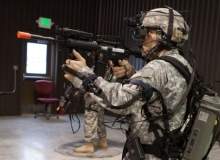

Oculus Rift, the virtual reality (VR) headset technology recently acquired by Facebook, is popularly known for providing incredibly realistic environments for gamers to explore. But developers are now looking beyond gamers to find ways for the Oculus Rift to be used by other professions. That’s particularly true for the military, which is exploring innovative ways to use the headset for troops.

Discover B2B Marketing That Performs
Combine business intelligence and editorial excellence to reach engaged professionals across 36 leading media platforms.
A British consultancy, in collaboration with the UK government’s Defence Science and Technology Laboratory (Dstl) and BespokeVR, is doing just that. Plextek Consulting has just announced the world’s first immersive medical training system for the military using the Oculus Rift. According to the developers, it can simulate pre-hospital care on the battlefield and requires trainees to "negotiate and prioritise" clinical needs while under virtual fire.
Screenshots of the simulation show a wounded soldier sat against a rock with a foot torn off and blood trailing off into the distance. Smoke and explosions can be seen in the background and a rocket-propelled grenade is lying just ahead of the soldier.
Wearing the Oculus Rift allows a medic to take in their surroundings and, by using a hand-held controller, attend to the casualty. A ‘simulator controller’, responsible for the simulator and what it displays, can make things much more complicated for the trainee. They can decrease the consciousness of the injured soldier, simulate sniper fire or even trigger a bomb attack.
Heightened reality to trigger a sharper response experience
"Our work with Dstl is enabling us to revolutionise the way medical treatment can be applied in the battlefield, while creating a multitude of opportunities for advanced health training applications across a breadth of industries," said Plextek’s medical business development manager Collette Johnson.

US Tariffs are shifting - will you react or anticipate?
Don’t let policy changes catch you off guard. Stay proactive with real-time data and expert analysis.
By GlobalData"The innovative technology used in immersive reality solutions enables such a real-life perception that the education and response level of the trainee can be greatly heightened" Johnson added.
Plextek Consulting says the technology could be used to improve the negative psychological effects soldiers suffer when they experience medical trauma on the battlefield. Using virtual environments could be used to expand existing methods for soldiers’ medical training, which includes using amputee actors with realistic make-up to simulate injuries.
The Oculus Rift-enabled training could expand to non-military scenarios in the future including disaster relief and medical training for specialist trauma scenarios, which, according to Plextek, has the potential to be fully implemented in 2-3 years.
Meanwhile, in the military context, virtual reality technology is picking up steam as a feasible option for combat training, with the US Army debuting its VR-enabled Dismounted Soldier Training System in 2012. As a relatively inexpensive commercial off-the-shelf VR system, Oculus Rift could help facilitate the wider use of this immersive, high-tech training method. With the technology continuing to grow in sophistication, it seems likely that we will begin to see a more prominent debate emerging over the relative merits of VR training and its various real-life counterparts.

Follow Grant Turnbull on Google+
Additional reporting by Chris Lo


.gif)



